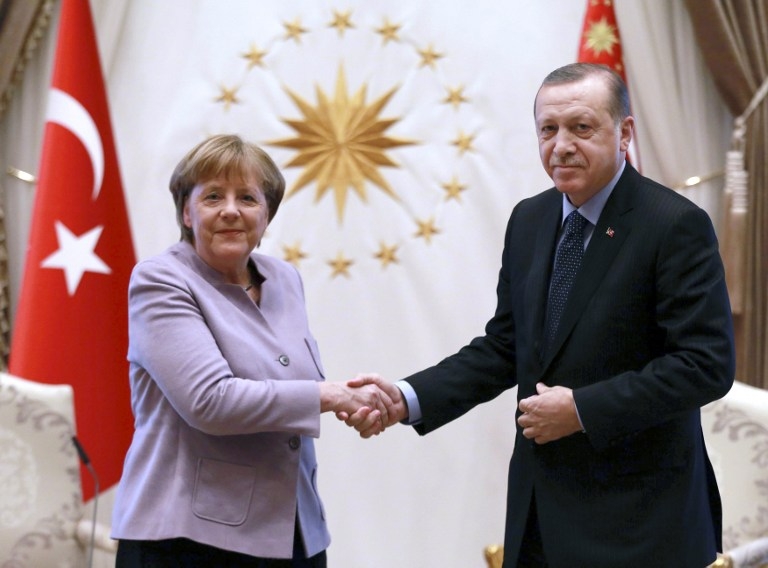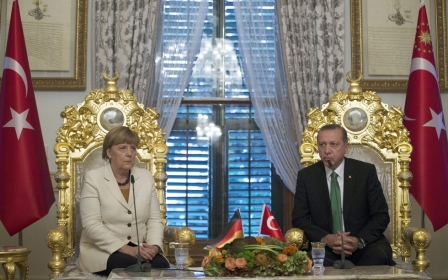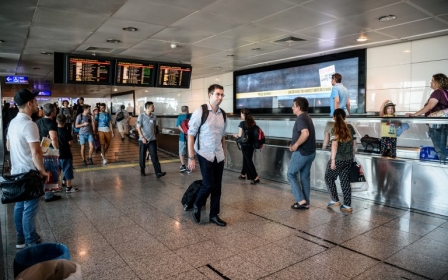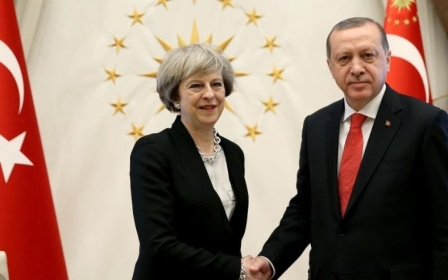Merkel urges Turkey to protect democracy and free press in tense meeting

ISTANBUL, Turkey – German Chancellor Angela Merkel called on Turkish President Recep Tayyip Erdogan to protect Turkey’s democracy in a tense news conference after a nearly three-hour-long meeting.
“I personally believe that the separation of powers is vital when the country is going through such a sensitive political process,” Merkel said in a joint press conference with Erdogan at the presidential palace in Ankara.
She was responding to a question about the referendum on constitutional change that will result in a presidential system, vastly enhancing Erdogan's powers if approved.
Merkel said she hoped that any new political system in Turkey would protect the democracy that Turks defended during a failed coup attempt last July.
She also said freedom of expression and a free press were essential for any democratic country and urged Turkey to respect these values.
Erdogan slammed the opposition accusing them of resorting to untruths to smear the proposed new system.
“The opposition is not being truthful at all. In the new system there will be an executive, a legislature and a judiciary. It will improve the speed of decision-making for the executive and also for the legislature. The judiciary will also carry out its functions,” Erdogan said.
The Turkish president said a referendum on the system was planned for April and that the nation would have the final say.
“The final decision belongs to the people. Whatever they say in the referendum, in April, I think, will be the final word,” he said.
Both leaders said they had frank and constructive talks in their lengthy meeting that touched on both regional and bilateral issues.
Sticky issues
Merkel also responded to a question about Germany allegedly harbouring followers of Fethullah Gulen, a US-based Turkish preacher accused by Turkey of masterminding the failed coup attempt.
“We need proof to take steps. Our courts decide on the basis of evidence. We have to respect the independence and decision of courts. Our justice ministers are in regular contact over these issues,” she said.
Both leaders also said they agreed on the need to cooperate and tackle all kinds of terrorism. Erdogan, however, slammed Merkel for using the word “Islamist terrorism”.
“As a Muslim president I find the use of such a term unacceptable. We shouldn’t use Islam and terrorism alongside each other. Islam means peace. By continuing to use such terminology we are not doing anyone any favours,” he said. “My country is waging the biggest fight against Daesh (the Arabic acronym for the Islamic State group) while others are not doing anything of substance. No one can use that term.”
Merkel responded by saying the words Islamic and Islamist were entirely different and that she was a firm believer in the right to freedom of religion.
Merkel is scheduled to visit the section of Turkish parliament which was bombed by putchists last July before meeting Turkish Prime Minister Binali Yildirim.
That will be followed by her recieving the leader of the main pposition Republican People’s Party (CHP) and a delegation from the pro-Kurdish Peoples’ Democratic Party (HDP) at the German Embassy in Ankara.
Tensions between the two long-standing allies have been high over the last few years with various crises, not least the huge influx of migrants, creating stumbling blocks.
New MEE newsletter: Jerusalem Dispatch
Sign up to get the latest insights and analysis on Israel-Palestine, alongside Turkey Unpacked and other MEE newsletters
Middle East Eye delivers independent and unrivalled coverage and analysis of the Middle East, North Africa and beyond. To learn more about republishing this content and the associated fees, please fill out this form. More about MEE can be found here.




